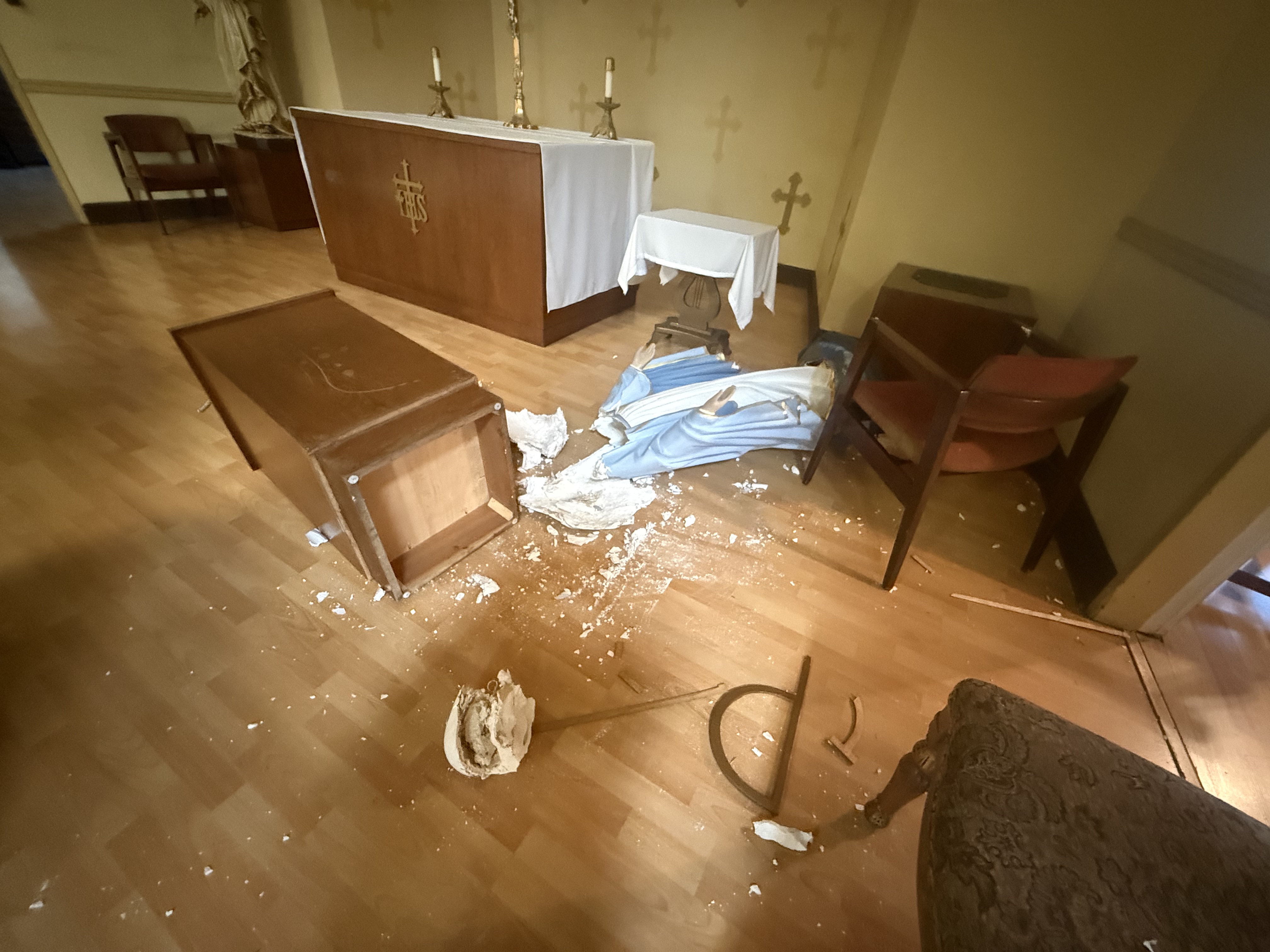![Department of Justice investigates vandalism at California Catholic school #Catholic Federal officials are investigating after a Los Angeles-area Catholic school was targeted in a major act of vandalism that included the beheading of a statue of the Blessed Mother. Assistant Attorney General for Civil Rights Harmeet Dhillon said on X on Feb. 2 that the Department of Justice’s civil rights division “will open an investigation into [the] awful crime” against Holy Innocents Catholic School in Long Beach.TweetCyril Cruz, the principal of the school, told EWTN News that she came into the school early on the morning of Feb. 2 and discovered the vandalism in the hall where the school holds Mass. “Our statue of the Virgin Mary was smashed, and the tabernacle was removed and thrown to the floor in an apparent attempt to force it open,” she said. “The atrium lovingly prepared by the Carmelite Sisters for our scholars was completely destroyed.” “Audio equipment and lighting were ripped from the walls, speakers and instruments loaded onto carts, and the missals our students use daily were soaked and ruined.” Photos shared with EWTN News showed the vandalization in multiple rooms, including the destroyed statue, overturned shelves, scattered papers and Mass materials, and other scenes of destruction.
Destruction is seen at Holy Innocents Catholic School in Long Beach, California, Monday, Feb. 2, 2026. | Credit: Photo courtesy of Holy Innocents Catholic School
Cruz said Los Angeles Auxiliary Bishop Marc Trudeau was scheduled to hold a reparation Mass at the school on Feb. 3. The pastor of Holy Innocents Catholic Church and School, Father Peter Irving, was also scheduled to lead a Eucharistic procession around the school “as we entrust our community to Christ and respond with prayer, faith, and hope.”Irving told EWTN News that the community was “very sad,” though they were “very grateful” that the Blessed Sacrament was “not violated,” he said. “The tabernacle was not breached although it was left damaged,” he said. “Investigators said that this was the worst desecration that they have seen.”
Missals are tipped over and thrown around at Holy Innocents Catholic School in Long Beach, California, Monday, Feb. 2, 2026. | Credit: Photo courtesy of Holy Innocents Catholic School
The vandalism has received national media coverage. A GoFundMe campaign, meanwhile, had raised nearly $76,000 by the morning of Feb. 3. That campaign said Trudeau described the incident as “the worst case of vandalism that he’s ever seen in the region.”Still, Cruz said, amid the destruction, “our community came together — scholars, families, and Knights of Columbus — to clean, restore, and prepare the hall so that Mass could once again be celebrated.” “Yesterday, our school community gathered in prayer to pray the rosary for healing and also for the conversion and mercy for those who committed this act,” she added. “We are grateful no one was physically harmed, and we are responding as a faith community with prayer, reparation, and trust in Christ,” she said.](https://unitedyam.com/wp-content/uploads/2026/02/department-of-justice-investigates-vandalism-at-california-catholic-school-catholic-federal-officials-are-investigating-after-a-los-angeles-area-catholic-school-was-targeted-in-a-major-act-of-vandali.jpg)
The DOJ’s civil rights division will investigate the “awful crime” at Holy Innocents Catholic School.

![Department of Justice investigates vandalism at California Catholic school #Catholic Federal officials are investigating after a Los Angeles-area Catholic school was targeted in a major act of vandalism that included the beheading of a statue of the Blessed Mother. Assistant Attorney General for Civil Rights Harmeet Dhillon said on X on Feb. 2 that the Department of Justice’s civil rights division “will open an investigation into [the] awful crime” against Holy Innocents Catholic School in Long Beach.TweetCyril Cruz, the principal of the school, told EWTN News that she came into the school early on the morning of Feb. 2 and discovered the vandalism in the hall where the school holds Mass. “Our statue of the Virgin Mary was smashed, and the tabernacle was removed and thrown to the floor in an apparent attempt to force it open,” she said. “The atrium lovingly prepared by the Carmelite Sisters for our scholars was completely destroyed.” “Audio equipment and lighting were ripped from the walls, speakers and instruments loaded onto carts, and the missals our students use daily were soaked and ruined.” Photos shared with EWTN News showed the vandalization in multiple rooms, including the destroyed statue, overturned shelves, scattered papers and Mass materials, and other scenes of destruction.
Destruction is seen at Holy Innocents Catholic School in Long Beach, California, Monday, Feb. 2, 2026. | Credit: Photo courtesy of Holy Innocents Catholic School
Cruz said Los Angeles Auxiliary Bishop Marc Trudeau was scheduled to hold a reparation Mass at the school on Feb. 3. The pastor of Holy Innocents Catholic Church and School, Father Peter Irving, was also scheduled to lead a Eucharistic procession around the school “as we entrust our community to Christ and respond with prayer, faith, and hope.”Irving told EWTN News that the community was “very sad,” though they were “very grateful” that the Blessed Sacrament was “not violated,” he said. “The tabernacle was not breached although it was left damaged,” he said. “Investigators said that this was the worst desecration that they have seen.”
Missals are tipped over and thrown around at Holy Innocents Catholic School in Long Beach, California, Monday, Feb. 2, 2026. | Credit: Photo courtesy of Holy Innocents Catholic School
The vandalism has received national media coverage. A GoFundMe campaign, meanwhile, had raised nearly $76,000 by the morning of Feb. 3. That campaign said Trudeau described the incident as “the worst case of vandalism that he’s ever seen in the region.”Still, Cruz said, amid the destruction, “our community came together — scholars, families, and Knights of Columbus — to clean, restore, and prepare the hall so that Mass could once again be celebrated.” “Yesterday, our school community gathered in prayer to pray the rosary for healing and also for the conversion and mercy for those who committed this act,” she added. “We are grateful no one was physically harmed, and we are responding as a faith community with prayer, reparation, and trust in Christ,” she said.](https://unitedyam.com/wp-content/uploads/2026/02/department-of-justice-investigates-vandalism-at-california-catholic-school-catholic-federal-officials-are-investigating-after-a-los-angeles-area-catholic-school-was-targeted-in-a-major-act-of-vandali.jpg)
The DOJ’s civil rights division will investigate the “awful crime” at Holy Innocents Catholic School.



Jan 15, 2026 / 06:00 am (CNA).
The attorney general of Ohio is moving to shut down a nursing home after a congregation of Catholic nuns sold it, amid reports that the facility’s “shockingly poor care” is placing elderly residents in “clear and present danger.”
House of Loreto, a nursing facility formerly run by the sisters of the Congregation of the Divine Spirit, has allegedly committed “widespread care failures,” Attorney General Dave Yost’s office said in a Jan. 13 press release.
The sisters were involved with the home from 1957, when then-Youngstown Bishop Emmet Walsh asked for the religious to run the facility. The current facility opened in 1963.
The Youngstown Diocese said in March 2025 that the home had been acquired by Hari Group LLC, a company based out of Ohio. In its press release announcing the sale the diocese did not note any troubles experienced by House of Loreto at the time. A diocesan spokesman said on Jan. 15 that the home was no longer under Catholic control after the sale.
In a court order request filed on Jan. 12, Yost’s office said that state inspectors have observed a “rapid deterioration of care” at the facility, with the filing claiming that “shockingly poor care” was putting residents in “real and present danger.”
Among the problems alleged by inspectors include the lack of a director of nursing, leaving the facility “spinning out of control” with repeated resident falls, improper medicine administration, denial of pain medication, and other alleged mismanagement issues.
The facility is “so dysfunctional” that the government “lacks any confidence that the current leadership … will be able to right the ship,” the court filing says.
The attorney general’s office said it is trying to get the facility shut down and “relocate residents to safer facilities.”
In a statement to EWTN News, the Youngstown Diocese said it was “deeply saddened” at the imminent closure of the facility.
Youngstown Bishop David Bonnar in the statement said the sisters “poured their lives into creating a home where the elderly were cherished and protected.”
“Their ministry at the House of Loreto was a profound witness to the Gospel,” the prelate said. “It is painful to see their legacy overshadowed by the serious concerns that have emerged under the new ownership.”
The facility said it takes its name from the Holy House of Loreto in Italy, said to be the home at which the Annunciation occurred and the Word was made flesh.
The nursing home said it seeks to foster “an environment where seniors can experience the same love and respect they would find in their own homes —truly standing on the threshold of heaven as they navigate life’s later chapters.”
Correction: This story originally identified the House of Loreto as a "Catholic-run" facility based on information from the facility's website. The home is actually no longer under Catholic ownership. This story was updated on Thursday, Jan. 15, 2026 at 9:30 a.m. ET.
Read More